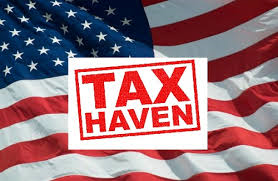The honky-tonk bar under neon lights on the town square serves Grand Teton Amber Ale and Yellowstone Lemonade. The Cowboy Coffee Co. offers bison chili and the Five & Dime General Store sells Stetson hats and souvenirs made from bullets.
In this tourist-friendly Western town, home to four celebrated arches fashioned from elk antlers, lawyers and estate planners draw customers with something far more exclusive.
It’s called the Cowboy Cocktail, and in recent years, the coveted financial arrangement has attracted a new set of outsiders to the least populated state in America.
The cocktail and variations of it — consisting of a Wyoming trust and layers of private companies with concealed ownership— allow the world’s wealthy to move and spend money in extraordinary secrecy, protected by some of the strongest privacy laws in the country and, in some cases, without even the cursory oversight performed by regulators in other states.
Millionaires and billionaires from around the world have taken note. In recent years, families from India to Italy to Venezuela abandoned international financial centers for law firms in Wyoming’s ski resorts and mining towns, helping to turn the state into one of the world’s top tax havens.
A dozen international clients who created Wyoming trusts were identified in the Pandora Papers, a trove of more than 11.9 million records obtained by the International Consortium of Investigative Journalists and shared with The Washington Post, exposing the movement of wealth around the world. The documents offer a rare look at Wyoming’s discreet financial sector and the people who rely on its services.
One was Moscow billionaire Igor Makarov, named under a 2017 law requiring the U.S. Treasury Department to list oligarchs and political figures close to the Russian government. Makarov’s company faced questions in the past about controversial transactions with Russia’s state-owned gas giant and about possible influence peddling involving the daughter of a U.S. congressman.
The matriarch of Argentina’s Baggio family, whose beverage company was accused by local officials of dumping industrial waste and whose son is embroiled in a money laundering investigation, also moved the management of its wealth to Wyoming.
So did the late Kalil Haché Malkún of the Dominican Republic. The polo player and army officer managed the private estates of reviled Dominican dictator Rafael Trujillo, who ordered the deaths of political enemies and thousands of Haitians.
For years, anti-money laundering experts and law enforcement have warned federal and state lawmakers that suspect money was flowing into U.S. tax havens, eluding taxing authorities, creditors and criminal investigators. In Wyoming, with the support of state lawmakers, the industry charged ahead, promoting a suite of financial arrangements to potential customers around the world.
At the heart of those arrangements are trusts, legal agreements that allow people to stash away money and other assets so they are protected from creditors and incur few or no tax obligations for themselves or their heirs. In exchange for these benefits, trust owners appoint an independent manager — typically a relative, friend or financial adviser — to determine when and how money is invested and spent.
Wyoming is one of a small number of states that allow customers to place a private company — often controlled by family members — at the helm of their trust, ensuring complete control of the assets and an additional layer of financial secrecy.
Some of the companies are unregulated, exempt from periodic examinations and other state scrutiny.
Customers can also establish a second company inside their trusts to hold the assets, such as property and bank accounts, concealing wealth behind yet another corporate layer.
It’s like a wrapped gift inside a wrapped gift. The more wrapping you put on, the harder it is to figure out if there has been tax avoidance or evasion or even financial crime. Very few people know what you’re doing.
— trust and estate expert Allison Tait
Using this approach – the Cowboy Cocktail – wealthy people can move money into the United States and invest and spend it with a level of anonymity found in few other tax havens.
“Wyoming is advertising itself as the new onshore-offshore — it’s going to get the clientele,” said University of Richmond law professor Allison Tait, a trust and estate expert who has studied the state’s layered financial instruments, including the cocktail.
“It’s like a wrapped gift inside a wrapped gift,” she said. “The more wrapping you put on, the harder it is to figure out if there has been tax avoidance or evasion or even financial crime. Very few people know what you’re doing, basically.”
The Haché family did not respond to requests for comment. Through his attorney, Makarov said the Treasury Department list was copied from a public source and “widely discredited,” that he has no personal relationship with Russian President Vladimir Putin and that he has never been charged with criminal wrongdoing. The attorney said Makarov’s Wyoming trust was properly disclosed.
A representative for the Baggio family declined to comment. The family has previously said that it reported the Wyoming trust to officials in Argentina.
There is no evidence in the Pandora Papers documents that the trusts in Wyoming sheltered criminal proceeds.
In a competitive global market, Wyoming’s financial incentives have stood out. One trust company 8,700 miles away in downtown Singapore recommended Wyoming on its website as a go-to tax haven that would “completely shield” clients’ names and assets. “Offshore Wyoming, USA,” noted another firm, this one near the Dnieper River in Ukraine’s bustling capital, Kyiv.
Click here to read the full story : International Consortium of Investigative Journalists
Have an IRS Tax Problem?
Contact the Tax Lawyers at
Marini & Associates, P.A.
Read more at: Tax Times blog








